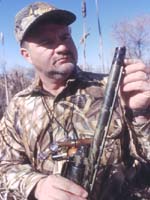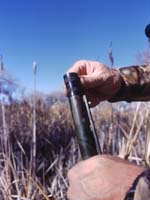
|
Features
|
|
|
|
Books
|
|
|
|
Fun & Games
|
|
|
|
Contact Us
|
|
|
John's Journal... Entry 73, Day 4
Reading the Ducks
 EDITOR'S
NOTE: Brad Harris, vice president of public relations at Outland Sports,
the owners of Lohman and M.A.D. calls, is a hunting expert and a longtime
duck hunter. More than 26-million households across the nation watch Outland
Sports television show, "Outdoor Traditions with Brad Harris."
EDITOR'S
NOTE: Brad Harris, vice president of public relations at Outland Sports,
the owners of Lohman and M.A.D. calls, is a hunting expert and a longtime
duck hunter. More than 26-million households across the nation watch Outland
Sports television show, "Outdoor Traditions with Brad Harris."
Question: Brad, everybody has a different "finishing-the-ducks-off
kind of call. Most people use a feeding call to finish off a flight of
ducks coming in to land. What do you use?
Answer: I think hunting ducks is somewhat different every day.
Some days the feed chatter works very well. Most days, I like a combination
of little soft feed chatter, used sparingly, and a lot of the clucks of
the mallard hen. I use a lot of clucks with soft quacks. I like the single
soft quacks, to give them confidence, with a little bit of feed call and
a lot of little soft clucks and sounds like that. Because sometimes you
need to coax the ducks, soft sounds will work. Other times, you've got
to stay on those ducks with a lot of aggressive quacking the whole time
to pull them in and make them land. So every day is different. You need
to be versatile. Read the ducks and see what they like. Then you'll know
whether you need to call aggressively all over the water or if you need
to back off and coax in the ducks.
 Question:
Tell me how you read the ducks.
Question:
Tell me how you read the ducks.
Answer: To read ducks, you simply watch them and the way they respond
to your sounds. The beautiful part about waterfowl hunting compared to
a lot of other calling situations is that generally you can see the bird
the entire time you're calling. Many times you can read what he likes
and doesn't like by watching how he responds, seeing whether he turns
to you, watching when he cups his wings, seeing when he hesitates or pauses
above certain sounds you may be making, determining which call makes that
duck turn on a dime and looking hard for his eyes. Every day is different.
There are days you read the ducks and they tell you how they want to be
called. Some days you need to be aggressive, other days you need to be
passive, and other days you need a combination of calling.
Tomorrow: Hunting Ducks in High-Pressure Areas
Check back each day this week for more about Brad Harris On Duck Hunting ...
Day 1 -General Duck-Hunting
Information
Day 2 -Acrylic vs. Wood Duck Calls
Day 3 -When to Use Different Types of Duck
Calls
Day 4 -Reading the Ducks
Day 5 -Hunting Ducks in High-Pressure Areas